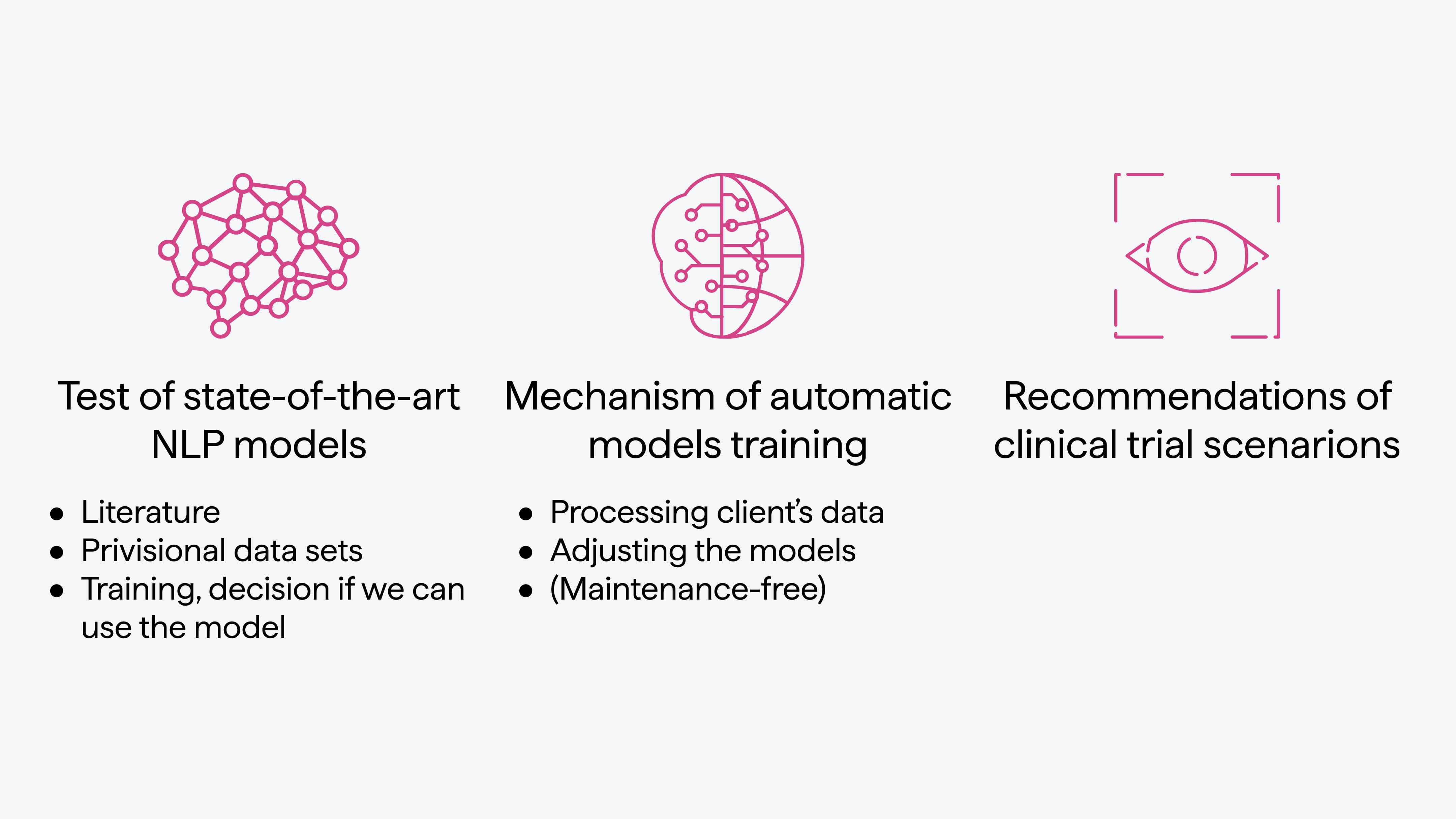AI-powered system for planning scenarios of clinical trials

Altimi helped develop an advanced system for planning clinical trial scenarios. The system leverages AI and NLP to analyze large volumes of medical protocols, improve decision-making, and accelerate the design of trials.
Making Sense of Vast Clinical Data
Planning clinical trials requires answering critical questions: sample sizes, inclusion/exclusion criteria, and effectiveness/safety evaluation.
- Existing protocols were unstructured and too large for manual processing.
- The client lacked in-house experience with machine learning and NLP.
- The goal was to create a recommendation system to make trial planning faster, more reliable, and cost-efficient.
A human cannot easily process hundreds of thousands of clinical trial protocols. We needed structured AI solutions to extract meaningful insights from this data.
AI, NLP, and Modular Microservices
Named Entity Recognition (NER) with BERT
- Extracted key concepts from clinical trial documents (e.g., drug names, patient metrics).
- Used BERT-based transformer models fine-tuned on a large database of clinical protocols.
- Developed mechanisms to automate dataset creation for training models, speeding up model adaptation for new concepts.

Handcrafted Rules
- Applied rule-based methods using regular expressions and part-of-speech detection for predictable medical phrases.
- Built a flexible Python framework allowing domain experts to add custom rules easily.
Text Classification
- Assigned classes to text passages to identify study objectives and relevant sections of protocols.
- Used BERT-based models with context-sensitive representations, fine-tuned on hand-labeled datasets.
Modular Microservices Architecture
- Deployed scalable microservices for NER and text classification.
- Enabled iterative training, predictions, and continuous improvements.
- Integrated mobile-ready, user-friendly interfaces for analysts.
Faster, Smarter, and Scalable Clinical Trial Planning
By implementing the AI-powered system, the client achieved a 70% increase in the speed of data extraction from clinical trial protocols, enhanced the accuracy of information recognition by 90%, and streamlined the planning and analysis of trial scenarios, improving overall operational efficiency by 60%. This enabled faster, more reliable decision-making and reduced the time and cost required to design and execute clinical trials.
Clinical Trial Planning System
Why is Named Entity Recognition (NER) important?
Named Entity Recognition automatically identifies key terms and concepts in clinical trial protocols, such as drug names, patient groups, or efficacy indicators. This allows analysts to process vast amounts of documents much faster, reducing manual work and minimizing the risk of errors. NER also enables data standardization and prepares it for further analysis and classification.
How do handcrafted rules complement AI models?
Handcrafted rules are used to capture predictable patterns in medical texts that may be difficult for AI models to learn at an early stage. They allow domain experts to easily incorporate their own knowledge into the system, for example, by defining specific medical phrases or recurring sentence structures. Combining rules with AI improves both precision and flexibility of the system.
Can the system classify complex medical texts?
Yes, the system uses BERT-based models that consider the context of the entire paragraph to assign the appropriate category to a text fragment. This enables automatic identification of the study objective, key indicators, or other classifications that previously required manual analysis. It accelerates the planning of clinical trial scenarios and supports research design decisions.
How are the models trained and updated?
The system employs a microservices architecture that allows iterative model training and deployment of updates without interrupting system operation. NER and classification models are initially trained on manually annotated data and later updated automatically, enabling rapid adaptation to new protocols and evolving clinical trial requirements.
Does the system support large-scale clinical trial planning?
Yes, thanks to its modular architecture and use of AI, the system can efficiently process large datasets. This enables faster planning of clinical trial scenarios, risk assessment, sample size determination, and definition of inclusion/exclusion criteria, while reducing costs and increasing the reliability of results.
Can the system adapt to new trial protocols and regulatory changes?
Yes, the system is flexible and can be easily updated to account for new trial protocols and regulatory changes, such as GDPR requirements or ethical guidelines. The microservices architecture allows rapid updates to individual modules without affecting the rest of the system.
How does the system improve efficiency for research teams?
The system significantly speeds up document analysis, reduces manual work, and minimizes the risk of missing important information. As a result, research teams can focus on experiment design and decision-making instead of manually reviewing thousands of clinical trial protocols.




